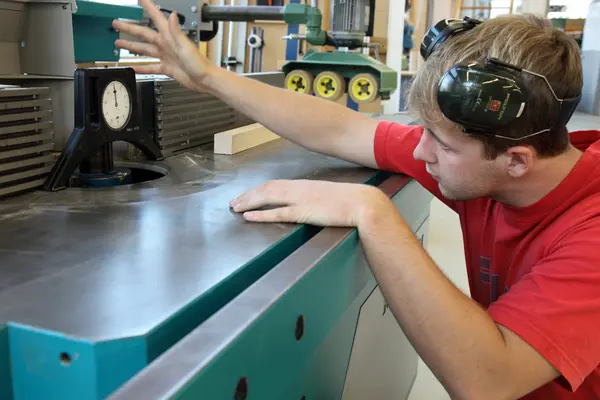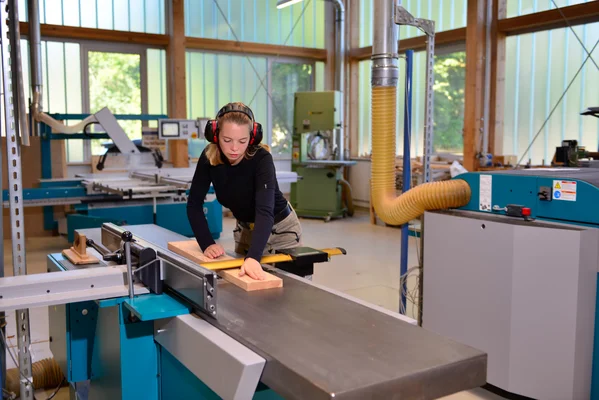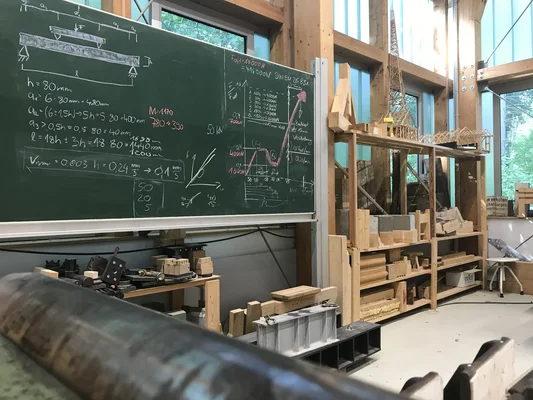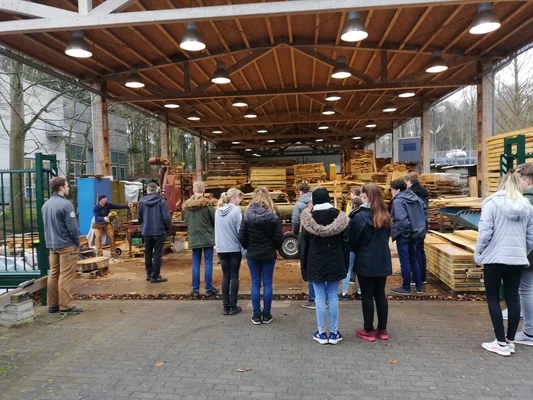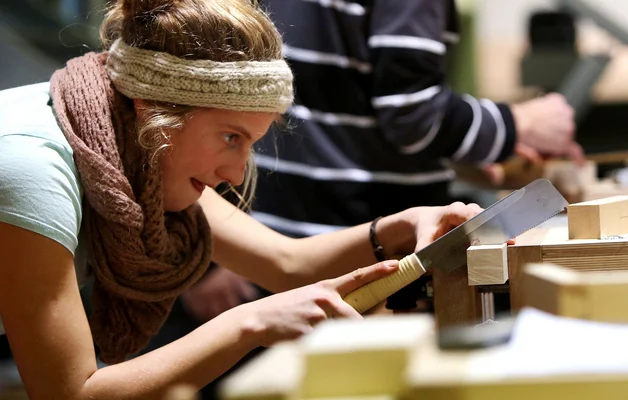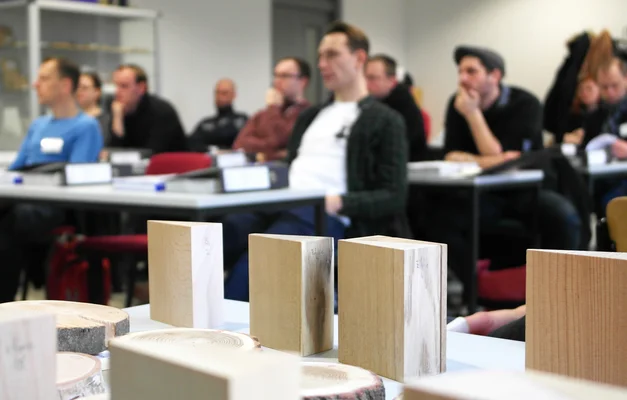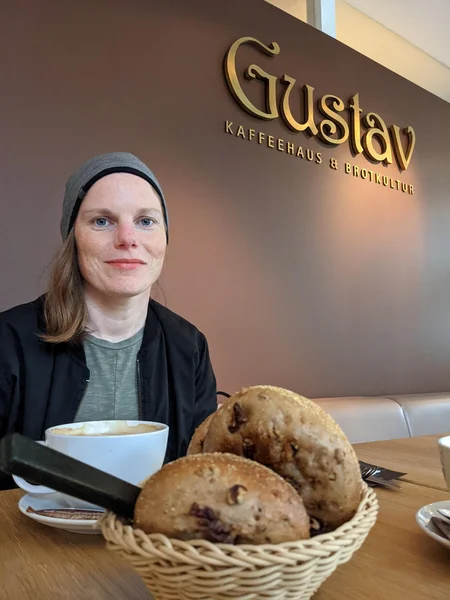Individual study contents
In the first three semesters, you will gain a solid foundation in natural sciences, engineering, and wood technology through lectures, seminars, practical sessions, and excursions.
In the fourth semester, you choose one of two specialisations: Structural Engineering or Wood Technology, and can further tailor your studies with elective modules.
The sixth semester includes a 20-week internship, which can be completed either in Germany or abroad.
In the seventh semester, after additional specialised modules, you will complete your Bachelor's thesis and graduate with the Bachelor of Engineering (B.Eng.) degree.
Modules per semester
In the first semester, you build on the skills you acquired at school in mathematics and the natural sciences and learn the first basics of wood engineering in the STEM subjects as well as woodworking and wood processing. A special feature is a course on sustainable development, in which students from all degree programmes take part.
You model practical problems in statics and strength theory with mathematical tools and present the results. Familiar with mathematical and physical methods and ways of thinking, you apply them in other basic subjects and advanced courses. You understand scientific working and thinking methods as the basis of all engineering activities.
You will learn the basics of machining wood and wood materials as well as terms of production technology and process models of machining. You are just as familiar with cutting materials and their areas of application as you are with the processes involved when a cutting edge engages with the material wood. You will know the machines and systems for geometrically specific products made of wood and wood-based materials.
In this module you will receive basic knowledge of wood biology and acquire botanical basics. In addition to a basic understanding of wood biology, you will be able to use tools for wood species identification and distinguish so-called wood defects. With knowledge of forest utilisation, you will be able to explain secondary forest utilisation. You will become familiar with the handling of specialised press and literature.
The module teaches you the basics of technical drawing, computer-aided design and modelling of components and assemblies. You will use computers to calculate technical correlations and create technical documentation. You link example sequences to simple programmes. You have also acquired knowledge of geometric design and data processing.
You will gain insight into sustainable development, especially in relation to raw materials and resources. The interdisciplinary, networked theoretical examination of the concept of 'sustainable development' allows you to apply the findings to practical examples. You will be able to name raw materials and their origin and classify their extraction in terms of ecological effects.
In the second semester, you further deepen your foundational knowledge. In addition to supplementary mathematical, technological and scientific content, you will be introduced to business management.
You deepen the basics of strength theory and the mathematical tools. You are familiar with analytical methods of dynamics (kinematics and kinetics). You solve engineering problems and issues and know physical mechanisms in dynamic and fluidic systems. You can assess and evaluate structural properties of the raw material wood.
You will learn about the engineering requirements for a joint. For theory, we teach the construction of joined components made of wood and hybrid components. You will apply current standards for load-bearing and non-load-bearing bondings and master the scientific and engineering methods for planning a bonded joint. The theoretical course content is deepened by accompanying practical courses.
In the module you will gain basic knowledge of wood chemistry and wood preservation, chemistry in engineering sciences, the chemical structure of wood, chemical wood properties and the application limits of wood. You will understand connections between the structure of wood components and their function, know wood-destroying fungi and insects as well as the basic measures of wood protection.
With basic engineering knowledge of mechanical engineering and metallic materials science, you will understand the relationships between materials, machine elements and design. In the design process, you will apply this to simple mechanical engineering components in accordance with standards. You will become familiar with sample production, series introduction, maintenance and repair work. You will be able to formulate the design requirements for complex mechanical engineering problems.
We provide you with a basic understanding of the principles of economic action. You will learn to link business management contexts with the contents and objectives of the sustainability concept in a practical way and become familiar with basic corporate structures, processes and decisions.
In the third semester, which marks the final semester of the foundation phase, you will explore further aspects of general engineering and wood engineering. An introduction to building construction theory will provide you with the foundational principles of structural engineering.
Now you will learn the basics of electrical engineering and solve electrical engineering problems using mathematical methods. You understand electrical and electronic applications in mechanical engineering and timber construction and classify electrical systems. With an electrotechnical specialist, you can analyse systems, develop approaches for concrete circuit tasks and arrange for purpose-specific work.
You will be taught the physical-technical knowledge of basic manufacturing technology processes. The mechanical and thermal principles for the manufacture of solid wood products are taught.
After this module, you will be able to categorise and name the manufacturing processes, use and assess machine tools professionally in planning.
Here, basic knowledge of wood physics and chemistry as well as wood pyrolysis is the topic. You will learn about essential physical properties. You will know physical wood properties, be able to assess the standard-compliant use of wood and have knowledge of pyrolysis, combustion and gasification of wood. You will be able to deal with regulations and standards relevant to wood technology and physics.
You apply in-depth knowledge of mechanical engineering fundamentals to the design and analysis of machines and systems and can design welded constructions. You calculate stresses and deformations in complex components and can estimate the service life of the components. You will evaluate the dynamic behaviour of machines and optimise designs according to requirements.
Our aim is to provide you with basic knowledge of building structures, the design of buildings, building materials and common construction methods in structural engineering (foundation engineering, steel construction, reinforced concrete and masonry construction). Furthermore, we enable you to create a design for a building.
In the fourth semester begins the specialisation phase of your studies. Depending on your chosen specialisation, you will take specialised modules, with the opportunity to personalise your programme further by selecting compulsory elective modules from wood engineering or other offerings at HNEE or partner universities.
You analyse mechatronic systems with engineering, electrical engineering and machine science fundamentals supplemented by mechatronic fundamentals and engineering mathematics. You can design and build simple systems. You have practical skills, confident handling of laboratory and measuring equipment and evaluate data with suitable statistical methods.
We teach the basics of building planning, jointly analyse partial and overall concepts in the planning process, apply the optimisation approaches for the use of solar inputs, summer thermal insulation and thermal comfort, understand the requirements and optimisation options for the thermal envelope of buildings and develop concepts for the energy supply of buildings.
You deal with the fundamentals of mechanical process engineering. This includes understanding the technical implementation of physical effects and interactions on particles with mass as well as the performance calculation and monitoring of plants for material conversion. You will gain an insight into the various basic operations of mechanical process engineering.
In relation to the knowledge of anatomical and structural differences of the wood species, process engineering references are made and different process variants are dealt with. You structure raw materials according to their quality and sort their uses in production. This is followed by the teaching of methods for structuring the production process. For the wood industry, aspects of process control are learned and quality criteria are taught.
In this module, you will learn the basics of property planning, analyse partial and overall concepts in the planning process and apply optimisation approaches with regard to the use of solar inputs, summer heat insulation and thermal comfort. This module also focuses on communicating the requirements and optimisation options for the thermal envelope of buildings, supplemented by the development of concepts for the energy supply of buildings.
- CNC 1
- Furniture and interior design/construction
- Alternative production methods
- Wood construction Basics of wood technology
- Properties of wood and wood-based materials with relevance to construction engineering
- Production and processes for components and building elements
- Sustainable building, material cycles 1 (specialisation in structural engineering)
- Integrated wood preservation (specialisation in structural engineering)
- Timber quenching and tempering (specialisation in wood technology)
- Special materials science (specialisation in wood technology)
In the fifth semester, you will continue your specialisation, with particular emphasis on the engineering project. Here, you will collaborate in a team to solve an engineering problem and document your findings according to scientific standards.
You work independently in a scientific manner and can also formulate your results in English. In a practice-oriented project work, you structure and control the work yourself and gain experience in self-management. The engineering project is a preliminary exercise for the final thesis, is to be completed in group work by three students and is supervised.
We teach you to understand building law contexts, to select basic designs and details for components and to develop components and connections that meet requirements. You will determine smoke management options and calculate components according to model fires of the IndBauRL. You will file the material requirements of the architectural planning and create rough fire protection concepts.
You will be able to design and calculate simple timber constructions with connections and joints, acquire knowledge of repair connections in renovation, have knowledge of the typical construction methods in timber construction, the use of design software and be able to understand and assess calculations and designs of other planners.
You know the basics of design theory with regard to sustainability and develop planning requirements for energy-efficient, sustainable buildings. You are familiar with the assessment of requirements of energy-efficient, climate-neutral construction methods, know methods of energy balancing, assess and optimise construction methods as well as characteristic values of thermal building physics and building climatics.
The focus is on structuring, designing and planning development processes in interior design and timber construction. We teach the design aspects of product development, communication skills with team members and third parties as well as presentation techniques for different target groups.
We present the basics of wood processing and lignocellulosic plants into panel-shaped materials in chipboard and fibreboard production - including the preparation of wood raw materials into particles as well as mixing and agglomeration processes. Tasks and experiments in the laboratory of the Fraunhofer Institute for Wood Research deepen the contents.
-
Business English
-
Production planning
-
CNC 2
-
Marketing
-
special wood biology
-
Specialisation module
-
Quality assurance
-
Building physics measurement technology
-
Fire protection
-
Raw wood quality
-
Sawn timber grading
-
Selected chapters Wood-based materials technology
-
Wood in construction
-
Automation Technology
-
Factory planning
During the sixth semester, you will undertake a 20-week internship, applying and deepening your knowledge in a practical setting. This internship can be completed either in Germany or abroad.
During the practical study semester, you will prepare for your professional activity with engineering-related activities and practical content and apply acquired theoretical knowledge and skills. You will also prepare for a management position with economic and social responsibility.
Finally, in the seventh semester, after completing additional modules, you will write your Bachelor’s thesis on an engineering topic, presenting your work in a scientific report. Upon successful defence of your thesis, you will graduate with the degree of Bachelor of Engineering (B.Eng.).
In the Business Management module, you will learn the basics of business law as well as human resources and business management. In addition, you will gain basic knowledge in construction and public procurement law. Through a fundamental understanding of the structural and procedural organisation in production companies, you will design operational value chains and learn the sensible use of power instruments.
We enable you to design new wooden structures and calculate them according to current standards.
The module shows interactions between materials and process influences using the example of veneer production. The effect of chemical and physical process variables on product quality is taught using plasticisation, cutting process, drying, etc. as examples. Thinking in variants to achieve technological goals is also part of the module.
- Business English
- Production planning
- CNC 2
- Marketing
- Special wood biology
- Specialisation module Quality Assurance
- Construction elements (specialisation in structural engineering)
- Sustainable building - material cycles 2 (specialisation in structural engineering)
- Building physics measurement technology
- Fire protection (specialisation in wood technology)
- Raw wood quality
- Sawn timber grading
- Selected chapters on wood materials technology (specialisation in wood technology)
- Wood in construction
- Automation technology
- Factory planning
With your final thesis, you complete the engineering-related part of the training. With your final thesis, you will implement theoretical knowledge and work on a transfer-oriented task within 12 weeks. You will apply scientific methods to develop efficient, practically applicable solutions. In the process, you will gain further experience in self-management.
